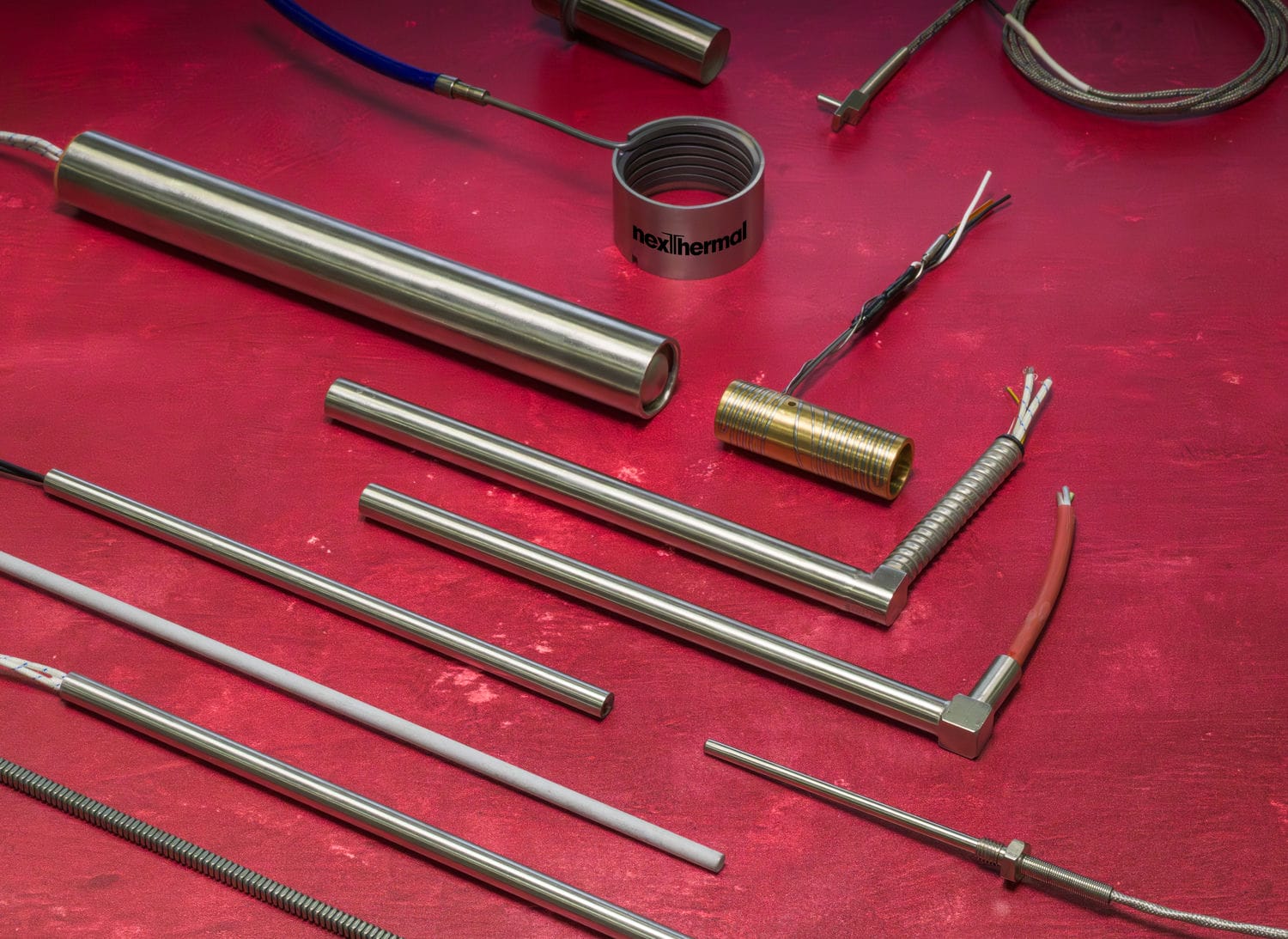Production facilities around the world rely on specific heating capabilities to meet their demands. Cartridge heaters are used widely across industries for heating plastics as well as metals in many Process Heating Applications.
What is a Cartridge Heater?
A cartridge heater is a cylindrical heating device that delivers accurate and consistent heating for a variety of materials, machines, and equipment. They fit into drilled openings to provide internal conduction heat in the tool to be heated. Cartridge heaters are simple to install and they give a uniform heat pattern with the right watt density required for the application. Cartridge heaters are adaptable and may be customized to meet the needs of a given application.
Cartridge heaters are often of the high watt density variety and hence are not always ideal for heating liquids in direct contact. Liquids do not transmit heat as rapidly as metals, causing the heater to overheat or the liquid to evaporate and boil quickly. So we need to be careful with the watt density based on specific application and flow rate.
How Do Cartridge Heaters Function?
The resistance wire inside the cartridge heater is heated by current, which heats the outside sheath of the heater. Through the mechanism of conduction, heat energy is transported from the wire to the metal sheath and then to the surrounding region. Most of the time cartridge heaters are used to heat from inside to outside of the tool or device.
The cartridge heaters are appropriate for generating high temperatures. It is regarded as one of the most efficient industrial heaters since all the heat generated in the coil is passed on to the surroundings.
The use of a cartridge heater starts at the insertion site. There is an insertion port or point on the device to be heated for heavy duty cartridge heaters. Holes are drilled and reamed into metal molds and metal blocks. The positioning of the hole takes more effort when it comes to sophisticated machinery and molds, and a precise design becomes necessary in such a scenario.
Installing a Cartridge Heater
Cartridge heaters are dependable and permanent heating elements when installed and operated properly. When a cartridge heater is installed improperly, it can cause a range of issues, including premature heating element failure. Choosing the proper cartridge heater for the job and double-checking whether the hole you are drilling is the right size for the heater are important factors. When using heat transfer lubricants, be cautious and protect the leads as much as possible.
Applications of Cartridge Heaters
Cartridge heaters come in handy in a variety of applications such as:
- Rubber molding
- Food production
- Medical devices
- Sensor measurement devices
- Die casting
- Hot melt adhesives
- Plastic welding
- Fluid heating
- 3D printers
- Seal bars
- Immersion tank heating
- Mass spectrometry
What are the types of Cartridge Heaters?
The types of cartridge heaters and how it will be used are decided by considering these factors:
- Maximum temperature
- Watt density
- Type of application
- Overall length
- Tube diameter
- Type of heating element
The materials utilized to make a cartridge heater have a big impact on its condition and life-span.
Types of cartridge heater:
- Thermocouple cartridge heaters – Cartridge heaters with a thermocouple heat the surface directly and use complex formulas to determine wattage, density and fit. The sheath temperature is determined by the internal thermocouple, which makes them suitable in industrial applications where there is limited space to put additional thermocouple. Thermocouple cartridge heaters come in a variety of shapes and sizes, each tailored for a specific use. The thermocouple can be mounted to the middle, end or anywhere inside of the heater.
- Flanged cartridge heaters – Flanged cartridge heaters can be attached to the heated piece with a flange permanently affixed to the outside end of the heater. The heater will fit more snugly in this configuration.
- Swaged cartridge heaters – Before the swaging process, all of the components, including the core, resistance wire, and oxide powder, are put to the heater. Mechanical swaging compresses the internal components and confines the heating within a die. This procedure boosts heat transfer efficiency and enhances the heat transfer process.
- Miniature cartridge heaters – A small cartridge heater must be three inches or shorter in length. Most miniature heaters are swagged for shock, vibration resistance as well as dielectric strength.
- High watt density cartridge heaters – To achieve maximum performance and extended life, high watt density heaters must be properly fitted. It is critical to calculate the right wattage for each installation. Rapid cycling of heaters from extremely low to extremely high temperatures drastically reduces their lifespan. The high watt density cartridge heaters are resistant to vibration and are mainly used in applications, which require limited heat. This type of cartridge heater is used in dies and molds, food processing machinery, shoe machinery, labeling machines, packaging machines, plastic processing machinery, heating gasses and liquids to name a few.
- Medium watt density cartridge heaters – In the medium watt density cartridge heaters, the resistance wire is located in the middle of the ceramic. Just like the high watt density cartridge heaters, the medium watt density cartridge heaters are also swaged.
Suppliers and manufacturers of cartridge heaters
There are many companies who make cartridge heaters. Nexthermal is one of the leading cartridge heater manufacturers in the US and India. Nexthermal builds cartridges catering to the customer’s needs while considering optimum performance based on the specific industrial applications. All Nexthermal products are available directly or through the cartridge heater suppliers chain present across the US and India.











